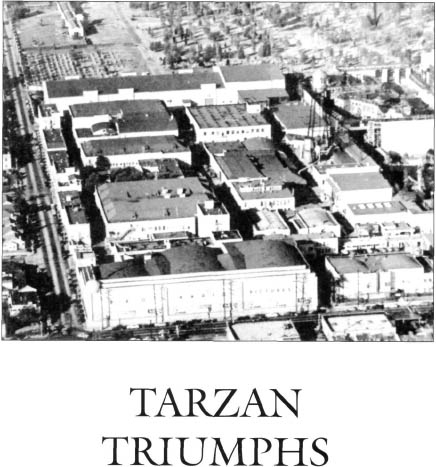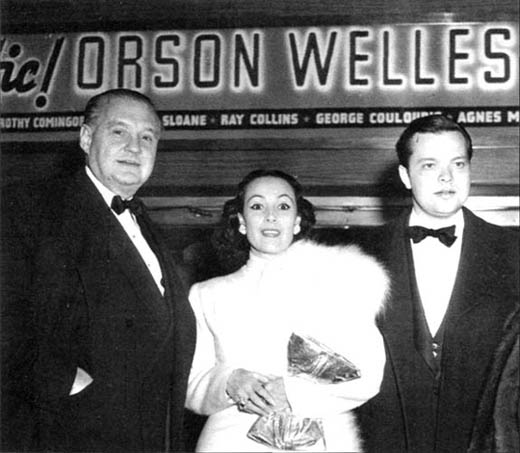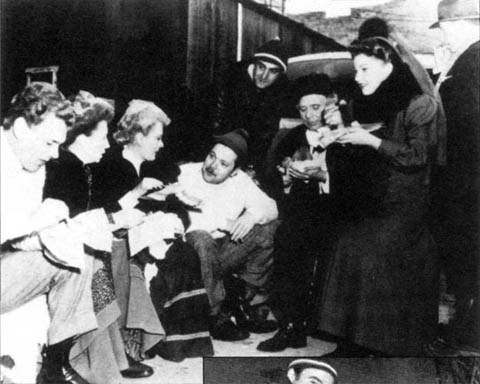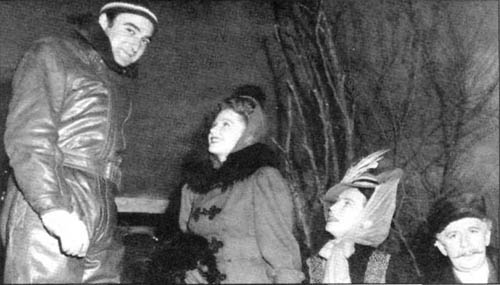Orson Welles: Hello Americans (79 page)
Read Orson Welles: Hello Americans Online
Authors: Simon Callow

Orson Welles Commentaries
10 March 1946.
Orson Welles Commentaries
17 March 1946.
Orson Welles
Commentaries
24 March 1946.
Radio Reader’s Digest
31 March 1946.
Orson Welles Commentaries
28 April 1946.
Orson Welles Commentaries
5 May 1946.
Orson Welles Commentaries
12 May 1946. George Hays substitutes for a sick Welles.
Orson Welles Commentaries
19 May 1946.
Orson Welles Commentaries
26 May 1946.
Orson Welles Commentaries
2 June 1946.
Around the World in Eighty Days
7 June
1946. Mercury Summer Theatre.
Orson Welles Commentaries
9 June 1946.
The Count of Monte Cristo
14 June 1946. Mercury Summer Theatre.
Orson Welles Commentaries
16 June 1946.
The Hitch Hiker
21 June 1946. Mercury Summer Theatre. By Lucille Fletcher.
Orson Welles Commentaries
23 June 1946.
Jane Eyre
28 June 1946. Mercury Summer Theatre. Featuring Welles, Alice Frost. Adapted by Norman
Corwin from the novel by Charlotte Brontë. Music by Bernard Herrmann.
Orson Welles Commentaries
30 June 1946.
A Passenger to Bali
5 July 1946. Mercury Summer Theatre.
Orson Welles Commentaries
7 July 1946.
The Search for Henri Le Fevre
12 July 1946. Mercury Summer Theatre.
Orson Welles Commentaries
14 July 1946.
Life With Adam
19 July 1946. Mercury Summer Theatre.
Orson Welles Commentaries
21 July 1946.
The Moat Farm Murder
26 July 1946. Mercury Summer Theatre.
Orson Welles Commentaries
28 July 1946.
Golden Honeymoon
2 August 1946. Mercury Summer Theatre.
Orson Welles Commentaries
4 August 1946.
Hell on Ice
9 August 1946. Mercury Summer Theatre.
Orson Welles Commentaries
11 August 1946.
Abednego the Slave
16 August 1946. Mercury Summer Theatre.
Orson Welles Commentaries
18 August 1946.
I’m a Fool/The Tell-Tale Heart
23 August 1946. Mercury Summer Theatre.
Orson Welles Commentaries
25 August 1946.
Moby-Dick
30 August 1946. Mercury Summer Theatre. By Herman Melville.
Orson Welles Commentaries
1 September 1946.
The Apple Tree
6 September 1946. Mercury Summer Theatre. By John Galsworthy.
Orson Welles Commentaries
8 September 1946.
King Lear
13 September
1946. Mercury Summer Theatre. By William Shakespeare.
Orson Welles Commentaries
15 September 1946.
Orson Welles Commentaries
22 September 1946.
Orson Welles Commentaries
29 September 1946.
Orson Welles Commentaries
6 October 1946.
Anniversary Program
29 May 1947 Command performance. Five-year anniversary of the Armed Forces Radio System.
The Magnificent Ambersons
RKO (Radio-Keith-Orpheum) Pictures. A Mercury Production. 88 minutes. Premiere: 13 August 1942.
Director and Screenplay: Welles, adapted from the novel by Booth Tarkington.
Associate Producers: Jack Moss, Richardson Wilson.
Cinematography: Stanley Cortez.
Editors: Robert Wise, Mark Robson.
Music: Bernard Herrmann (uncredited). Additional Music: Roy Webb.
Art Director: Mark Lee Kirk.
Sets: Al Fields.
Special Effects: Vernon L. Walker.
Sound: Bailey Feser, James G. Stewart.
Costumes: Edward Stevenson.
Assistant Director: Freddie Fleck. Additional footage directed by Norman Foster, Robert Wise, Freddie Fleck, Joseph Cotten, Jack Moss.
Cast: Tim Holt (George Minafer), Joseph Cotten (Eugene Morgan), Dolores Costello (Isabel Amberson), Anne Baxter
(Lucy Morgan), Agnes Moorehead (Fanny Minafer), Ray Collins (Uncle Jack Amberson), Richard Bennett (Major Amberson), Don Dillaway (Wilbur Minafer), Erskine Sanford (Roger Bronson), J. Louis Johnson (Sam), Charles Phipps (Uncle John), Gus Schilling, Georgia Backus (additional Cast), Narrator (Welles).
Journey into Fear
RKO (Radio-Keith-Orpheum) Pictures. A Mercury Production. Premiere: 12
February 1943. 68 minutes.
Director: Norman Foster.
Producer: Welles.
Screenplay: Joseph Cotten, based on the novel by Eric Ambler.
Cinematography: Karl Struss.
Music: Roy Webb.
Art Directors: Albert S. D’Agostino, Mark-Lee Kirk.
Sets: Darrell Silvera, Ross Dowd.
Special Effects: Vernon L. Walker.
Sound: Bailey Fesler, James G. Stewart.
Editor: Mark Robson.
Costumes: Edward Stevenson.
Cast: Joseph Cotten (Howard Graham), Dolores Del Rio (Josette Martel), Jack Moss (Peter Banat), Everett Sloane (Kopeikin), Welles (Colonel
HaKi
), Ruth Warrick (Stephanie Graham), Frank Readick (Mr Mathis), Jack Durant (Gobo), Agnes Moorehead (Mrs Mathis), Eustace Wyatt (Dr Haller), Shifra Haran (Mrs Haller), Edgar Barrier (Kuvetli), Hans Conreid (Magician), Richard Bennett (Captain), Stefan Schnabel,
Robert Meltzer, Herbert Drake, Bill Roberts (additional Cast).
The Stranger
The Haig Corporation. An International Pictures Production. Distributed by RKO. 95 minutes.
Director: Welles.
Producer: Sam Spiegel (credited S. P. Eagle).
Screenplay: Anthony Veiller.
Story: Victor Trivas, Decla Dunning.
Cinematography: Russell Metty.
Editor: Ernest Nims.
Production Design: Perry Ferguson.
Music: Bronislaw Kaper.
Costumes: Michael Woulfe.
Assistant Director: Jack Voglin.
Cast: Welles (Franz Kindler/Charles Rankin), Loretta Young (Mary Longstreet), Edward G. Robinson (Inspector Wilson), Philip Merivale (Judge Longstreet), Richard Long (Noah Longstreet), Konstantin Shayne (Konard Meinike), Billy House (Potter), Byron Keith (Dr Lawrence), Martha Wentworth (Sarah), Pietro Sosso (Mr
Peabody), Erskine Sanford (Party Guest).
The Lady from Shanghai
Columbia Pictures. 86 minutes.
Director and Screenplay: Welles, based on Sherwood King’s
If I Die Before I Wake
.
Associate Producers: Richard Wilson, William Castle.
Cinematographer: Charles Lawton Jr.
Music: Heinz Roemheld.
Song ‘Please Don’t Kiss Me’ by Roberts and Fisher.
Editor: Viola Lawrence.
Art Directors: Stephen
Goosson, Sturges Carne.
Sets: Wilbur Menefee, Herman Schoenbrun.
Sound: Lodge Cunningham.
Costumes: Jean Louis.
Special Effects: Lawrence Butler.
Camera: Irving Klein.
Assistant Director: Sam Nelson.
Cast: Welles (Michael O’Hara), Rita Hayworth (Elsa Bannister), Everett Sloane (Arthur Bannister), Glenn Anders (Grisby), Ted de Corsia (Sidney Broom), Gus Schilling (Goldie), Erskine Sanford
(Judge), Evelyn Ellis (Bessie), Louis Merrill (Jake), Harry Shannon (Taxi Driver), Wong Show Ching (Li), Sam Nelson (Captain), Carl Frank (District Attorney), Richard Wilson (DA’s Assistant).
Macbeth
Republic Pictures. A Mercury
Production
. 112 minutes (Welles’s cut), 89 minutes (revised cut).
Director and Screenplay: Welles, based on the play by William Shakespeare.
Producer: Charles K.
Feldman.
Associate Producer: Richard Wilson.
Cinematography: John L. Russell.
Editor: Louis Lindsay.
Art Director: Fred Ritter.
Sets: John McCarthy Jr, James Redd.
Music: Jacques Ibert. Conducted by: Efrem Kurtz.
Dialogue Director: William Alland.
Special Effects: Howard Lydecker, Theodore Lydecker.
Sound: John Stranksy Jr, Garry Harris.
Second Unit Director: William Bradford.
Assistant
Director: Jack Lacey.
Optical Effects: Consolidated Film Industries.
Costumes: Adele Palmer, Fred Ritter, Welles.
Hair: Peggy Gray.
Cast: Welles (Macbeth), Jeanette Nolan (Lady Macbeth), Dan O’Herlihy (Macduff), Roddy McDowell (Malcolm), Alan Napier (Holy Father), Edgar Barrier (Banquo), Erskine Sanford (Duncan), John Dierkes (Ross), Keene Curtis (Lennox), Peggy Webber (Lady Macduff, Voice
of Witch), Lurene Tuttle (Gentlewoman, Voice of Witch), Christopher Welles (Macduff’s son), Jeffy Farber (Fleance), Archie Heugly (Young Siward), Gus Schilling (Porter), Brainerd Duffield (First Murderer, Voice of Witch), William Alland (Second Murderer).
‘His Honor, the Mayor’,
The Free Company Presents
… Text of the radio broadcasts (R108), Dodd and Mead, 1941.
Anonymous, ‘The Sleepy Lagoon Murder Case’ (pamphlet). Mercury Press, 1942. Welles wrote the introduction to this reactionary essay on a Hispanic man who was unjustly accused of murder.
‘Moral Indebtedness’,
Free World
, October 1943.
‘Unknown Soldier’,
Free World
, December
1943.
‘The Good Neighbor Policy Reconsidered’,
Free World
, March 1944.
‘Habits of Disunity’,
Free World
, May 1944.
‘Race Hate Must Be Outlawed’,
Free World
, July 1944.
‘War correspondents’,
Free World
, August 1944.
‘American Leadership in ’44’,
Free World
, September 1944.
‘Liberalism – Election’s Victor’,
Free World
. December 1944.
‘Orson Welles Almanac, Orson Welles today’,
New York Post
, 1945.
‘G.I. Bill of Rights’,
Free World
, January 1945.
‘In Memoriam: Mankind Grieves for Our Late President’,
Free World
, May 1945
‘Now or Never’,
Free World
, September 1945.
The Liberation of Paris
Asch Records, 1944 Political speeches and commentary.
In the American Tradition
Decca Records, 1945 Political speeches and commentary.
The Happy Prince
Decca Records, 1946
No Man is an Island
Decca Records, 1946 Literary/political speeches and commentary featuring the works of John Donne, Pericles, Patrick Henry, John Brown, Abraham Lincoln and Émile
Zola.

 George Schaeffer, Dolores del Rio and Orson Welles when the going was good. At the Los Angeles premiere of
George Schaeffer, Dolores del Rio and Orson Welles when the going was good. At the Los Angeles premiere ofCitizen Kane
, May 1941.
 Lunch in the ice factory: a brief break in filming
Lunch in the ice factory: a brief break in filmingThe Magnificent Ambersons
.
